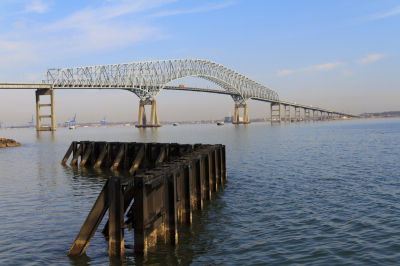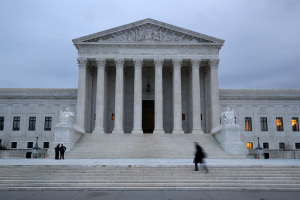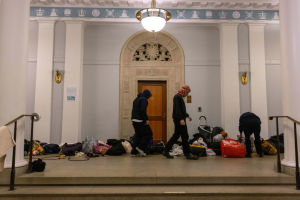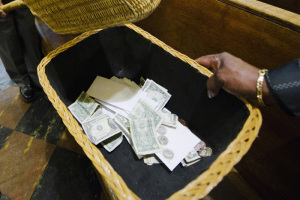Woke elites demand renaming of Francis Scott Key Bridge

The war on America as founded continues unabated.
As we well know, the Francis Scott Key Bridge was destroyed recently, and already the woke elites are calling for it to be renamed.
Key, who wrote what became the basis for our National Motto, was a man of his times. And those times don’t measure up to today’s standards. So off with his head, metaphorically speaking.
The Washington Times noted: “Key’s reputation has taken a hit in recent years along with other historical figures who owned slaves. Key also represented slaveholders in court and was a proponent of racist views ... As a lawyer, he also represented slaves seeking freedom and he asserted ‘all men are free.’ But he held eight enslaved people when he died.”
Since many Americans, including prominent ones, owned slaves in the past, does that mean they should be entirely dismissed, or erased from our history?
I am absolutely convinced that abortion is the taking of innocent babies’ lives. Future generations will look in horror at the cavalier attitude toward this evil which should be unthinkable. Will cancel culture in the future cancel us because we allowed such horrors? Will Joe Biden and Barack Obama be erased from our national memory?
As to slavery, note these insights from Michael Farris, the general counselor of the National Religious Broadcasters, from a recent interview he did for Coral Ridge Ministries-TV.
Farris said of today’s war on America’s history: “Now we see many, many forces in our country, the 1619 Project and others like it, that are saying America was an illicit, improper, immoral nation from the beginning. And the reason they do that is because they say, ‘Well, look at July 4th, 1776, and we had slavery; and we had problems of inequality in other areas.’”
Farris added, “Well, that's like judging a baby's life on the day it's born. America was founded on July 4th, 1776 and the ideals should be our judge. And so, have we reached our ideals? Were those the right goals? That's the question to be asked. Not were we reaching those goals on the day we were born, but were those the right goals? And then the second question is, how are we doing on those goals?”
While we can all agree that Francis Scott Key was wrong on the issue of the great evil of slavery, we should still be grateful for his contributions to the American experience.
Key’s poem, “The Star-Spangled Banner,” was inspired by what he saw and interpreted as the hand of Providence to help our country at a time of crisis during the War of 1812. For two centuries his poem, which became our National Anthem, inspired Americans with gratitude to be a part of our country — one nation under God.
Since 1956, our national motto is “In God We Trust.” Despite the intense secularism of our day, it still is. The origin of this phrase gets back to a phrase in Key’s song, our National Anthem.
Key was on board a British ship (our enemy in that war) being held overnight against his will. He was an eyewitness to the incessant, overnight British bombing of Fort McHenry, which protected the Port of Baltimore. This was in mid-September 1814, a month after the British invaded our nation’s capital and burned down the White House and the U.S. Capitol, which housed the Supreme Court.
Thus, the buildings used by the three branches of government were burned down by the British. But in those days, a much more handsome prize was the older city of Baltimore. Fort McHenry guarded that city and its port.
Hence, the battle that Key witnessed. He helplessly watched overnight as cannonball after cannonball was shot against the fort through the night of September 13 and the morning of the 14th. Would the fort be standing by the morning? Would the flag on the fort be still waving?
Key was relieved that indeed it was, and he could see “by the dawn’s early light” that “our flag was still there.” In the last verse of his famous song, he notes, “Praise the Power that hath made and preserved us a nation. Then conquer we must, when our cause it is just, and this be our motto: ‘In God is our trust.’”
Recently, in various sports venues, it has been en vogue to “bend a knee” in protest during the singing of the anthem or to miss it by being in the locker room instead, as apparently happened with the LSU women’s basketball team recently.
But this is just another example of the war on America as founded. Self-rule under God is the essence of the American experiment. Francis Scott Key turned out to be key in formulating our national motto, which reminds us of that.
Jerry Newcombe, D.Min., is the executive director of the Providence Forum, an outreach of D. James Kennedy Ministries, where Jerry also serves as senior producer and an on-air host. He has written/co-written 33 books, including George Washington’s Sacred Fire (with Providence Forum founder Peter Lillback, Ph.D.) and What If Jesus Had Never Been Born? (with D. James Kennedy, Ph.D.). www.djkm.org? @newcombejerry www.jerrynewcombe.com




























